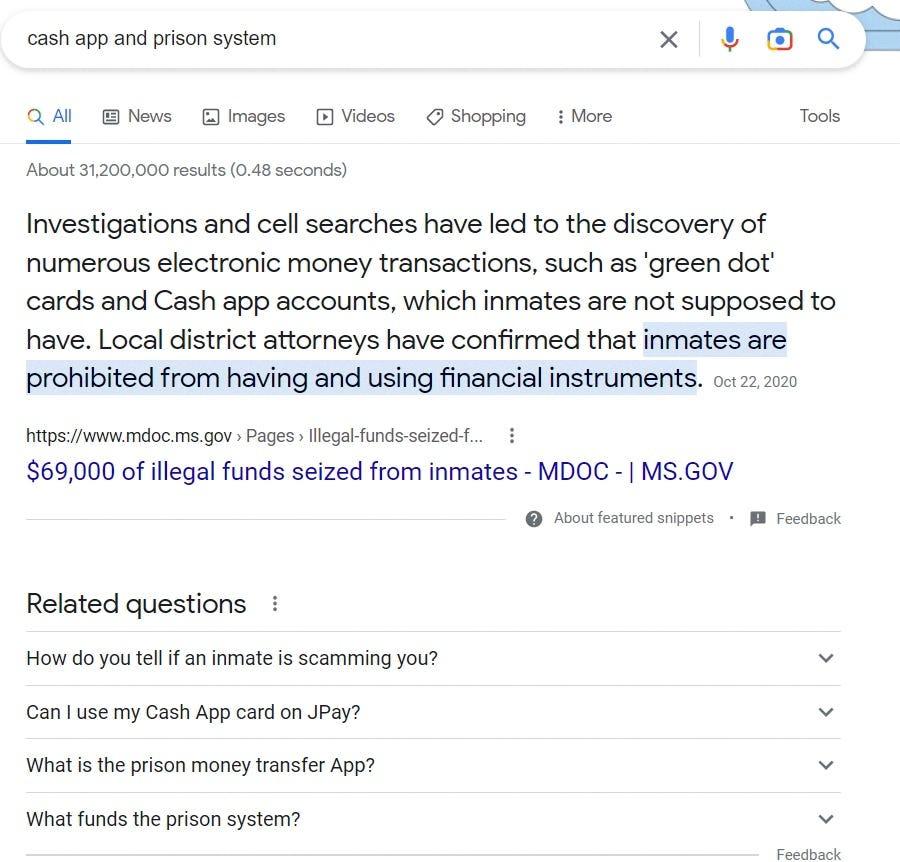Inmates and the Use of Cash App: A Detailed Insight
When it comes to inmates, one might assume that their financial needs are taken care of by the prison system. However, the reality is quite different. Inmates often rely on various means to access funds, and one popular method in today’s digital age is through the use of Cash App.
Cash App, a mobile payment service, has gained popularity for its convenience and ease of use. It allows users to send and receive money, pay bills, and even invest in stocks. While it may seem surprising, inmates have found ways to utilize this platform to their advantage.
So why do inmates use Cash App? The answer lies in the limitations and restrictions they face within the prison system. Prisons typically provide the bare minimum when it comes to food, clothing, and hygiene supplies. Many basic necessities that most people take for granted, such as deodorant and shampoo, are often only available to those who can afford them.
This is where Cash App comes into play. Inmates often rely on financial support from friends and family on the outside. By using Cash App, they can receive funds quickly and discreetly, enabling them to purchase essential items that are not provided by the prison. This includes personal care products, extra food, and even communication services like phone calls and emails.
Additionally, Cash App allows inmates to access digital marketplaces within the prison system. While this may sound dubious, it is a reality that cannot be ignored. Inmates often engage in trades and transactions, ranging from selling homemade crafts to distributing contraband items. Cash App provides a convenient and secure way for them to exchange funds, making it an attractive option for their illicit activities.
It is important to note that while Cash App is a legitimate platform, its use within the prison system raises ethical concerns. Inmates engaging in illegal activities or using funds for illicit purposes can lead to further criminal charges and consequences. The authorities are aware of these practices and take measures to monitor and prevent such activities.
The use of Cash App among inmates serves as a means to overcome the limitations and restrictions imposed by the prison system. It allows them to access funds, purchase essential items, and engage in various transactions. However, it is crucial to recognize the potential for abuse and illegal activities associated with this practice. The prison authorities strive to maintain control and prevent further criminal behavior. As technology continues to advance, it is essential to address these issues and find ways to ensure the integrity and security of financial transactions within the prison system.
How Do You Know If An Inmate Is Using You?
There are several signs that can indicate if an inmate is using you:
1. Constantly asking for money: If the inmate frequently asks you for money, especially large sums or on a regular basis, it could be a sign that they are taking advantage of your generosity.
2. Requests for money for other inmates: If the inmate asks you to send money to other inmates, especially without a valid reason or explanation, it may be a red flag. This could indicate that they are involved in illegal activities, such as paying off debts or involved in drug deals.
3. Manipulative behavior: If the inmate constantly tries to manipulate your emotions, guilt-trip you, or make you feel obligated to provide for them, it could be a sign of exploitation. They may use emotional tactics to get what they want without considering your well-being.
4. Lack of gratitude or appreciation: If the inmate shows little or no appreciation for the support you provide, it could suggest that they are only interested in what they can get from you. Genuine gratitude is often a sign of a healthy and mutually beneficial relationship.
5. Inconsistent or dishonest communication: If the inmate’s stories or explanations about their needs or financial situations frequently change or seem inconsistent, it could indicate dishonesty and an attempt to manipulate you. Pay attention to inconsistencies and be cautious.
6. Unfulfilled promises: If the inmate makes promises to change their behavior or situation but consistently fails to follow through, it could suggest that they are using you. Empty promises can be a tactic to keep you hooked and providing for them.
7. Unexplained gifts or favors: If the inmate suddenly starts sending you gifts or favors without a clear reason, it could be an attempt to manipulate you. They may be trying to create a sense of indebtedness or reliance on their actions.
It’s crucial to trust your instincts and be wary of any signs that suggest you are being taken advantage of. Setting healthy boundaries and being aware of these indicators can help protect yourself from being used by an inmate.

Why Do Inmates Always Ask For Money?
Inmates often ask for money because they have limited access to basic necessities and amenities in prison. Here are some reasons why inmates frequently request financial assistance:
1. Food: Prison meals are often basic and lack variety, leaving inmates unsatisfied and hungry. By asking for money, they can purchase additional food items from the commissary, such as snacks, drinks, and extra meals.
2. Hygiene products: Prisons typically provide inmates with limited hygiene supplies, such as soap and toothpaste, but these may be of poor quality or insufficient in quantity. Inmates may need extra money to buy additional hygiene products like shampoo, deodorant, toothbrushes, and razors.
3. Clothing and footwear: In many prisons, inmates are provided with a standard uniform that may not be comfortable or suitable for different weather conditions. By requesting money, inmates can purchase additional clothing items, socks, and shoes to stay comfortable and maintain personal hygiene.
4. Phone calls and communication: Inmates often rely on phone calls to stay connected with their loved ones and seek support. However, making phone calls from prison can be expensive, and inmates may need money to cover the costs of communication.
5. Legal fees: Inmates may require financial assistance to hire lawyers or pay for legal representation. Legal fees and court costs can be significant, and inmates may reach out to friends, family, or support networks for financial support to navigate the legal process.
6. Personal items and entertainment: In prison, access to entertainment options, such as books, magazines, or hobby materials, may be limited. Inmates may request money to purchase these items to pass the time and engage in productive activities.
7. Health-related expenses: In some cases, inmates may need money to cover medical expenses not provided by the prison, such as over-the-counter medications or medical supplies.
It’s important to note that not all inmates request money, and some prisons have programs or initiatives to provide additional support to inmates in need. However, due to the limited resources and bare minimum provisions in many prisons, inmates often rely on financial assistance from outside sources to improve their quality of life and meet their basic needs.
Can You Go To Jail For Scamming On Cash App?
Individuals can face legal consequences, including imprisonment, for engaging in scams on Cash App. Cash App scams involve fraudulent activities conducted through the mobile payment platform, with the intention of deceiving and defrauding users. While I am not a legal professional, it is important to note that engaging in scams or fraudulent activities is illegal and can result in criminal charges.
The severity of the punishment depends on various factors, such as the nature and extent of the scam, the amount of money involved, and the jurisdiction where the crime was committed. In the United States, for instance, scamming on Cash App can potentially lead to charges like wire fraud, identity theft, or theft by deception.
If convicted of wire fraud, which involves using electronic communications to defraud others, individuals can face imprisonment for up to 20 years. Additionally, identity theft charges can result in a maximum sentence of up to 15 years, while theft by deception may lead to imprisonment for varying periods based on the value of the stolen funds.
It is crucial to remember that laws and penalties may vary in different countries and jurisdictions. Therefore, if you suspect any fraudulent activity or have been a victim of a scam on Cash App, it is recommended to report the incident to the appropriate authorities, such as your local law enforcement agency or the platform itself.
How Do Inmates Know They Have Money On Their Books?
When funds are deposited into an inmate’s account, an automated voicemail message is sent to notify them. This voicemail serves as a prompt, informing the inmate that money has been added to their books. This convenient system ensures that inmates are aware of any financial activity and allows them to keep track of their funds.
The voicemail message is automated to ensure efficiency and accuracy. It eliminates the need for manual notifications, saving time for both the correctional facility staff and the inmates. By using this system, inmates can quickly and easily receive updates regarding their account balances.
The automated voicemail message is sent each time funds are deposited into the inmate’s account. This means that whenever someone deposits money into the inmate’s books, they will be promptly notified. This system ensures that inmates are always informed about any financial transactions occurring in their accounts.
In addition to the voicemail notification, some correctional facilities may also provide other means of communication to inform inmates about their funds. These may include written notifications, electronic messages, or even in-person notifications during designated times. The specific methods used may vary depending on the facility’s practices and resources.
To summarize, inmates are notified of money on their books through an automated voicemail message. This system ensures that inmates are promptly informed of any financial activity in their accounts, providing them with the necessary information to manage their funds effectively.
Conclusion
Inmates rely heavily on money to meet their basic needs and to navigate the prison system. While prisons provide the bare minimum in terms of food, clothing, and hygiene supplies, many necessary items are only available to those who can afford them. This creates a situation where inmates often have to rely on their own financial resources or the support of family and friends to obtain essential items like deodorant and shampoo.
Furthermore, the need for money in prison extends beyond just basic necessities. Inmates may also use money to access additional services, such as phone calls, emails, or even educational programs. These services can be crucial for maintaining connections with loved ones, pursuing personal growth, or preparing for a successful reintegration into society upon release.
However, it is important to be cautious about sending money to inmates, as there is a risk of being taken advantage of or unwittingly supporting illicit activities within the prison. Large sums of money or frequent transfers to other inmates can be red flags for potential exploitation or involvement in illegal activities.
The financial aspect of being an inmate is an important and often overlooked aspect of their experience. Access to money can greatly impact an inmate’s quality of life, ability to maintain connections, and opportunities for personal growth during their time in prison.







